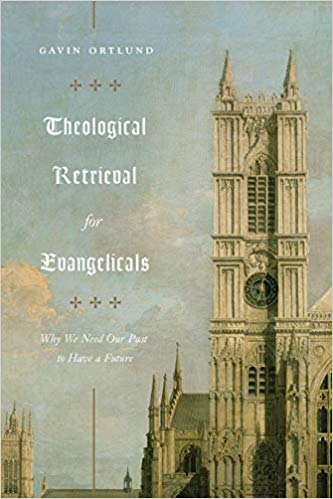A Book Review from Books At a Glance
By Ryan McGraw
Retrieval theology has become increasingly important in recent years. The idea behind theological retrieval is to engage with the entire Christian theological tradition with an aim to apply classic Christian beliefs to contemporary issues. Gavin Ortlund’s premise in this book is that Evangelicals have largely bypassed the catholic Christian tradition to their detriment, and that they need to recover classic Christian sources in order to engage in theological reflection today (46-52). He does so persuasively, building a platform for theological retrieval and providing ample examples of what this should look like in practice. He effectively reaches a broad audience of Evangelical pastors and interested laypeople, calling them to the important fact that the catholic Christian tradition is theirs and that it does not merely belong to the Roman Catholic or Eastern Orthodox churches. While his approach has some limitations, this book is a useful call to a segment of Christians that have, historically, not been as interested in their catholic heritage.
The book is divided into two sections, laying the groundwork for theological retrieval and offering examples that show what this should look like. The first chapter asks the pointed question as to whether Evangelicals can engage in theological retrieval. Ortlund argues that they can and they should on the ground of Christ’s faithfulness to the church in all ages. Chapter two in particularly interesting because Ortlund lists numerous examples of key Evangelical leaders who have turned to Roman Catholicism or Eastern Orthodoxy due to the prevalence of Christian tradition in both churches. He argues rightly that this has resulted from the historical rootlessness of the Evangelical movement (52-53). Instead of rejecting Christian tradition, Evangelicals need to develop a proper use of it (57-60). Chapter three then outlines some benefits and perils surrounding theological retrieval. The four chapters comprising the second section of the book give examples of retrieval, touching theological figures such as Boethius, Calvin, Aquinas, Irenaeus, Anselm, Athanasius, Gregory the Great, and many others. Ortlund’s topics include relevant modern questions related to the Creator/creature distinction, divine simplicity, Christ’s work of substitution, and Gregory the Great as a model for pastoral care. His authors are interesting and well chosen, allowing Ortlund to press classic theological stances on key issues in a more full-orbed way than is common in many modern debates. He argues well for the need to contextualize historical figures in order to hear them in their own voices rather than to read contemporary issues into their thought as well (e.g., 29). While sometimes his choices for “retrieval” are a bit too contemporary, such as including T. F. Torrance in his list of chosen conversation partners (108-114), he provides a sound model for drawing critically from classic Christian sources. He even includes colorful illustrations from J. R. R. Tolkien and C. S. Lewis, which makes for interesting reading. The largest payoff of the book is that Ortlund shows that the classic Christian tradition belongs to all Christians and that we have much to learn from it.
One of the primary difficulties with calling Evangelicals to theological retrieval, however, is identity. Movements like Reformed and Lutheran orthodoxy sought to situate themselves in the catholic Christian tradition while reforming it according to Scripture. They largely expressed this task through their own confessional traditions, which served as aids to interpret Scripture, while being rooted in historic expressions of things like the doctrine of the Trinity and the two natures of Christ. The problem is that Evangelicalism has no orthodoxy and no clear confessional tradition. In light of this fact, the question is whether Evangelicals can engage in theological retrieval while retaining their somewhat nebulous theological identity. Ortlund’s call to retrieval is necessary to promote the unity and purity of the church and to prevent her from being tossed about by every wind of doctrine, but it is hard to see how Evangelicalism can pursue these goals without slipping into some form of orthodoxy, whether Roman Catholic, Eastern, Reformed, or Lutheran. Evangelicalism has the disadvantage of engaging in retrieval without theological guidelines or historical benchmarks.
Yet Ortlund’s call for theological retrieval is important. It reflects the fact that Christ has always taught his church faithfully through the pastors and teachers that he gave as gifts to her. All Christians need to learn that the catholic Christian tradition belongs to them, subordinated to the authority of Scripture. In this sense, all Christian readers can benefit from this book, though people from various confessional backgrounds are more likely to do so than Evangelicals in the long run.
Ryan M. McGraw
Greenville Presbyterian Theological Seminary
